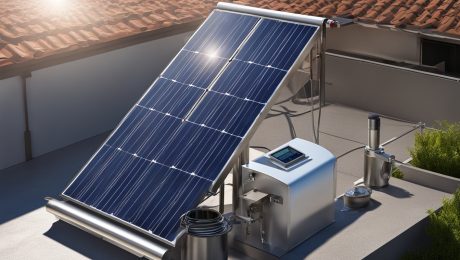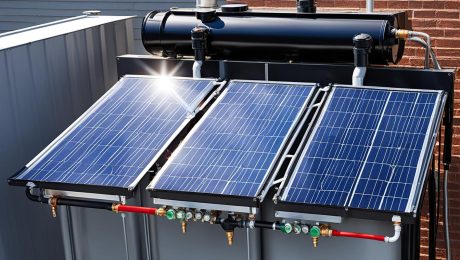What is min temp of water in solar water heater
We’re all looking for ways to use less energy and help the planet. Solar water heaters are a great choice for doing just that. They use the sun’s energy to heat water, which is good for our homes and the environment. Let’s look at the minimum water temperature needed for these heaters and how they work.
Key Takeaways
- Solar water heaters use the sun’s energy to heat water, making them a sustainable and cost-effective option for Indian homes.
- The minimum water temperature required for a solar water heater can vary depending on factors like the system’s design and location.
- Proper installation and maintenance are crucial for optimal performance and energy efficiency.
- Investing in a solar water heater can lead to significant long-term energy savings and a reduced carbon footprint.
- Understanding the different types of solar water heaters can help you choose the best system for your household needs.
Introduction to Solar Water Heaters
Solar water heaters use the sun’s power to heat water at home. They are a green and cost-saving way to warm water. We’ll look into how these systems work and why they’re good for your home.
Understanding the Basics of Solar Water Heating Systems
Solar water heating systems have a few main parts: a solar collector, a storage tank, and a circulation system. The solar collector on your roof catches the sun’s energy and heats the water. This heated water goes into an insulated tank for use in the home, like for baths or washing dishes. The circulation system keeps the water moving, making sure it gets heated evenly.
Benefits of Using Solar Water Heaters
- Cost-Effective: Solar water heaters cut down your energy bills by using the sun’s free energy. This means saving money over time.
- Environmentally Friendly: They use solar energy, which is good for the planet. This makes them a green choice for your home.
- Reliable and Durable: These heaters need little upkeep and last a long time. They give you dependable hot water at home.
- Increased Property Value: Adding a solar water heater can raise your home’s value. It’s a great feature for potential buyers.
Learning about solar water heating systems and their benefits helps you decide if it’s right for your home. It leads to using clean, affordable hot water for years.
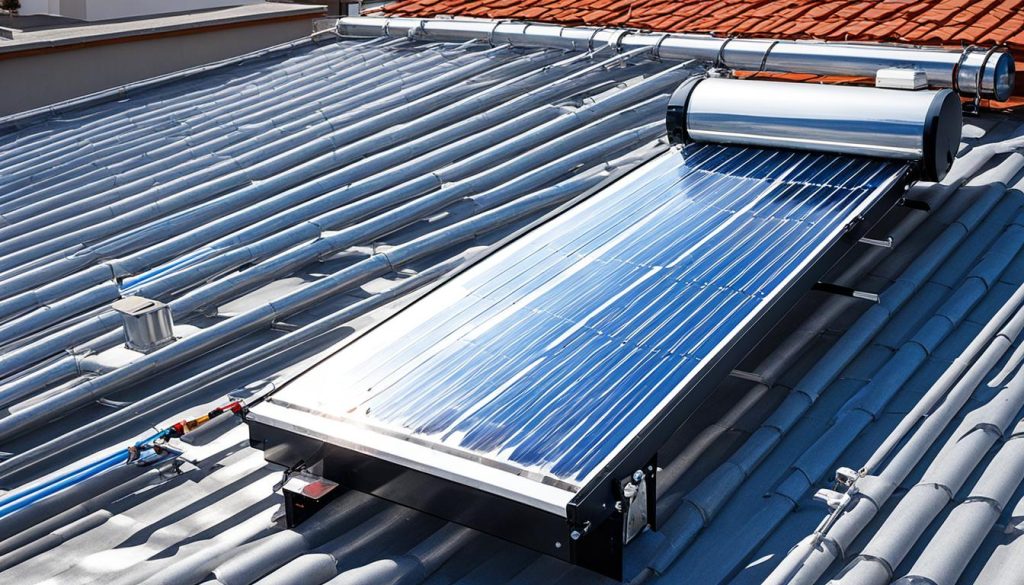
Factors Affecting Water Temperature in Solar Water Heaters
The temperature of water in solar heaters changes with the environment. Things like sunlight strength and how long it shines affect the heater’s performance. Knowing these factors helps you get the best water temperature and use your solar energy well.
Sunlight Intensity and Duration
Sunlight’s strength and how long it shines are key to heating water in solar heaters. The more sunlight and the longer it shines, the hotter the water gets. Weather, time of day, and solar panel angle also play a part in how much sunlight hits the tank.
- Sunny days with clear skies give the most intense sunlight, making water hotter.
- Cloudy days reduce sunlight strength, making water cooler.
- The angle of solar panels affects sunlight absorption, with the best angle giving the highest temperatures.
Knowing how sunlight affects water temperature helps owners adjust their systems. They can move panels or pick the best spot to get the most solar energy. This keeps water temperatures right.
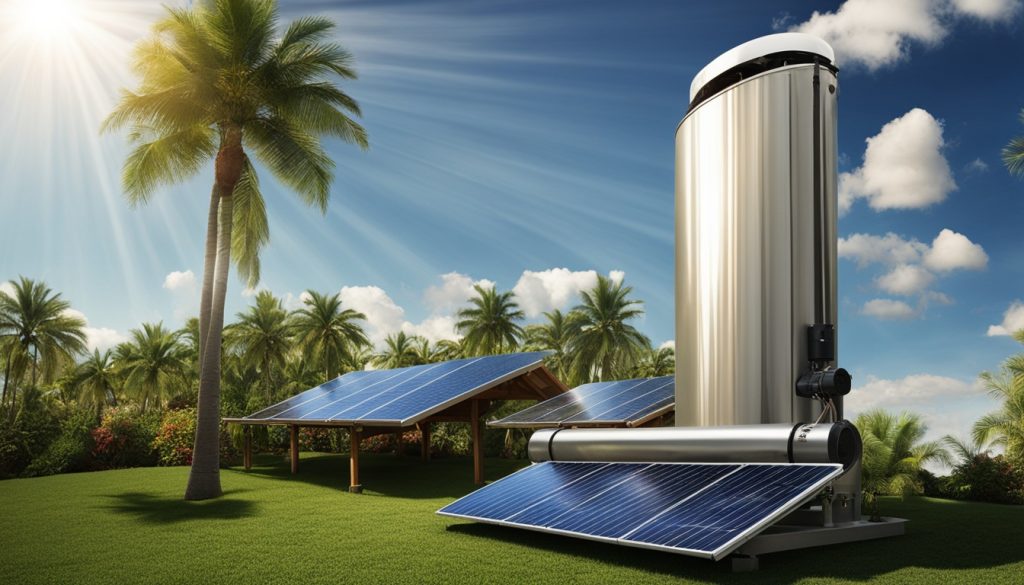
“The hotter the water, the more efficiently the solar water heater can operate and the greater the energy savings for the homeowner.”
For the best solar water heater performance, consider these environmental factors. This lets homeowners enjoy the benefits of renewable energy and have hot water all day.
Minimum Water Temperature Requirements
Solar water heaters need a certain minimum temperature for different uses. These temperatures depend on what you need the water for. Most people agree on the minimum temperatures needed for everyday tasks.
For everyday tasks like taking a bath or washing dishes, you should have water at least 120°F (49°C). This keeps the water hot enough for comfort and stops harmful bacteria like Legionella from growing.
- For washing clothes, you need water at least 110°F (43°C). This is enough to clean most fabrics well.
- In the kitchen, you should have water at least 140°F (60°C) for cooking and cleaning. This kills harmful germs and keeps food safe.
- Some places have rules that say you must have water at least 140°F (60°C) for hot water at home. This is for health and safety.
Solar water heaters can meet these temperature needs easily. They use the sun’s power to give you hot water without harming the planet. This makes them a great choice for your home.
| Household Use | Minimum Water Temperature |
|---|---|
| General Domestic Use (bathing, washing dishes) | 120°F (49°C) |
| Washing Clothes | 110°F (43°C) |
| Kitchen Use (cooking, sanitizing) | 140°F (60°C) |
Knowing what temperature you need for your home helps you pick the right solar water heater. This ensures it works well and saves energy.
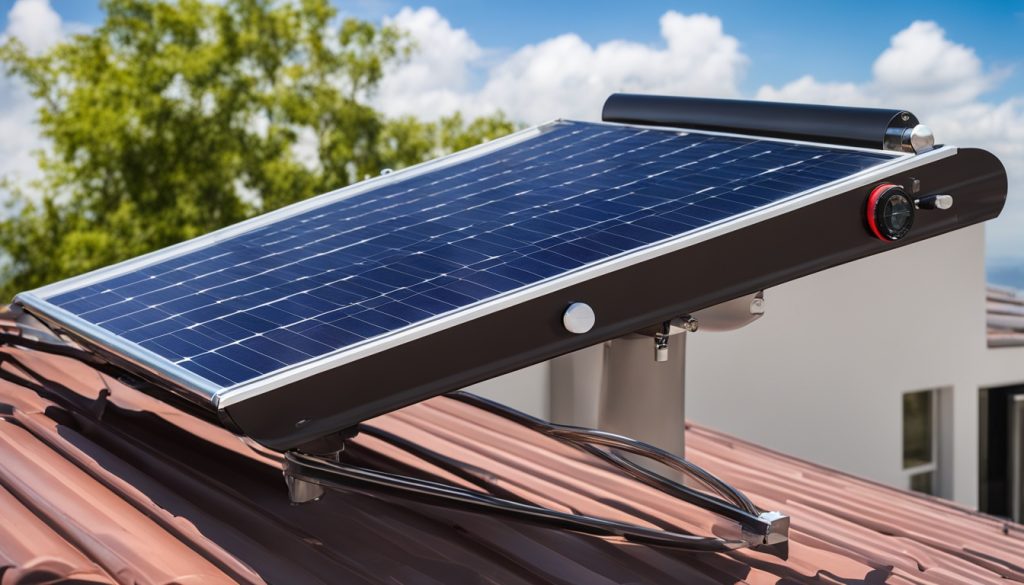
“Using the sun to heat your water cuts your energy bills and lowers your carbon footprint. It’s a green choice for your home.”
Solar Water Heater
Solar water heaters are a great choice for those looking for an eco-friendly and cost-saving way to heat water. They use the sun’s energy to warm water. This reduces the need for traditional energy sources and lowers bills.
The solar collector is the core of a solar water heater. It catches the sun’s rays and heats the water flowing through it. The heated water goes into an insulated tank, ready for use anytime. This design makes solar water heaters efficient and eco-friendly.
| Feature | Description |
|---|---|
| Solar Collector | The solar collector captures the sun’s energy and transfers it to the water. It can be a flat-plate or evacuated tube collector, each with its own benefits. |
| Storage Tank | The insulated tank keeps the heated water at the right temperature. It’s important to choose the right size for your needs. |
| Circulation System | A pump moves water between the collector and the tank. This helps transfer heat efficiently. |
The solar water heater 200 ltr price or the solar heater price changes based on the system size, collector type, and brand. Yet, the savings on energy bills over time can make the cost worth it.
“Harnessing the sun’s power to heat our water is a smart and sustainable choice that benefits both our wallets and the environment.”
Understanding the components and how they work helps homeowners choose the right solar water heater. It’s a step towards a more energy-efficient future.
Optimizing Solar Water Heater Performance
To make sure your solar water heater, solar geyser, or solar water heating system works well, you need to install it right and keep it maintained. We’ll give you tips and best practices to boost your system’s efficiency and make it last longer.
Proper Installation
Getting your solar water heater installed correctly is key. Here are some important points to remember:
- Positioning: Make sure the solar collectors face the sun and are angled right to catch the most sunlight all day.
- Plumbing connections: Make sure all plumbing connections are tight to avoid leaks and keep the water flowing well.
- Insulation: Insulate the water tank and pipes well to stop heat from escaping.
- Shading: Keep the solar collectors free from any shadows or obstructions that could block the sunlight.
Routine Maintenance
Keeping your solar water heater in good shape is crucial for its efficiency. Here are some maintenance tasks to do regularly:
- Cleaning: Clean the solar collectors often to remove dirt, debris, or anything that could block sunlight.
- Inspections: Check the system often for leaks, broken parts, or other problems that need fixing.
- Flushing: Flush the system now and then to clear out sediment that could slow down water flow and heating.
- Adjustments: Change the tilt or position of the solar collectors as needed to match the sun’s changing position over the seasons.
By following these steps for installation and maintenance, you can make sure your solar water heater, solar geyser, or solar water heating system works great and lasts a long time.
Types of Solar Water Heaters
Homeowners have two main options for solar water heaters: flat plate collectors and evacuated tube collectors. Both use the sun’s power to heat water. Yet, each has its own benefits and features.
Flat Plate Collectors
Flat plate solar water heaters are the most common. They have a flat panel that goes on your roof. This panel has an absorber plate that catches the sun’s rays well, and pipes or tubes carry the water through it.
These collectors are simple, long-lasting, and affordable. They’re a good pick for those on a budget who want a solar water heater.
Evacuated Tube Collectors
Evacuated tube solar water heaters use glass tubes with a vacuum inside. This setup cuts down on heat loss and boosts efficiency. It’s ideal for colder areas or homes with lots of hot water needs.
These collectors cost more than flat plate ones but are more efficient and give more hot water. They suit big homes or businesses needing a strong solar heating solution.
Choosing either flat plate or evacuated tube collectors can cut your energy bills and carbon footprint. Using the sun’s power means a steady supply of hot water and helping the planet.
| Feature | Flat Plate Collectors | Evacuated Tube Collectors |
|---|---|---|
| Design | Flat, rectangular panel | Series of glass tubes |
| Efficiency | Moderate | High |
| Performance in Cold Climates | Good | Excellent |
| Cost | Lower | Higher |
Sizing a Solar Water Heater for Your Needs
Choosing the right solar water heater is key to your household’s hot water needs. The size of the heater affects its efficiency, cost, and performance. It’s crucial to pick the right size for your home.
When picking a solar water heater, consider your family size, daily water use, and local climate. These factors help you find the perfect size for your home’s hot water needs.
Factors to Consider when Sizing a Solar Water Heater
- Family Size: A bigger family means more hot water use. So, you’ll need a larger solar water heater.
- Daily Water Usage: Think about how much hot water your household uses daily. This includes showers, laundry, and washing dishes. Knowing this helps you choose the right solar water heater size.
- Climate: Your area’s climate affects the solar water heater size you need. Cold areas might need a bigger system to keep water hot. Warmer areas might do well with a smaller unit.
Consider these factors to make sure your solar water heater fits your needs. This ensures efficiency, saves money, and helps the environment.
| Solar Water Heater Size | Recommended Household Size | Estimated Cost |
|---|---|---|
| 100 Liters | 1-3 people | ₹30,000 – ₹50,000 |
| 200 Liters | 3-5 people | ₹50,000 – ₹80,000 |
| 300 Liters | 5-7 people | ₹80,000 – ₹120,000 |
The solar water heater price can change based on brand, quality, and extra features. Always talk to a pro to find the best solar water heater for your needs and budget.
“Investing in the right-sized solar water heater can not only meet your hot water demands but also maximize your energy savings and reduce your carbon footprint.”
Cost and Energy Savings with Solar Water Heaters
Investing in a solar water heater might seem pricey at first. But, the long-term benefits are truly amazing. The initial cost is higher than traditional heaters. Yet, the savings on energy and less carbon emissions make it a smart choice for eco-friendly homeowners in India.
Upfront Investment vs. Long-Term Savings
The price of a solar water heater changes based on size, type, and brand. On average, they cost more than regular water heaters. But, the savings on your energy bills can cover this cost over time.
Solar water heaters use the sun’s energy to heat water. This means you use less electricity or gas. So, you’ll see big monthly savings on your bills.
The Indian government also offers incentives and subsidies for renewable energy like solar water heaters. These can lower the upfront cost. By using these programs, you can enjoy solar heating benefits without a big financial hit.
FAQ
What is the minimum water temperature required for a solar water heater?
The minimum water temperature for a solar water heater depends on the use and personal preference. For everyday household needs, a temperature of about 55°C (131°F) is usually enough. But, for bathing, you might need water at 60°C (140°F).
How do solar water heating systems work?
Solar water heating systems use the sun’s energy to warm water for your home. They have a solar collector, a storage tank, and a circulation system. The collector absorbs sunlight, heating the water in the tank. Then, the heated water is sent to your home for tasks like bathing, washing dishes, and laundry.
What are the benefits of using a solar water heater?
Solar water heaters have many advantages:
– They cut down on energy bills by using the sun’s free energy.
– They are good for the environment since they don’t emit harmful gases or pollute the air.
– They can also increase your home’s value, making them a sought-after feature.
How does sunlight intensity and duration affect the water temperature in a solar water heater?
Sunlight strength and how long it lasts are key to the water temperature in solar water heaters. The more intense and long-lasting the sunlight, the hotter the water gets. Things like the time of day, season, and weather affect how much solar radiation the collector gets, which changes the heating performance.
What are the different types of solar water heaters?
There are two main kinds of solar water heaters:
– Flat plate collectors use a flat surface to catch the sun’s heat and transfer it to the water.
– Evacuated tube collectors have glass tubes with a vacuum to absorb more heat and lose less.
The choice depends on your climate, space, and budget.
How can I ensure optimal performance of my solar water heater?
For the best performance, make sure your solar water heater is installed and maintained well. Some tips include:
– Place the collector where it gets the most sunlight all day.
– Clean the collector regularly to keep it efficient.
– Check and maintain the circulation system and storage tank.
– Do system checks and fix any issues to keep it running well.
Following these tips can make your solar water heater work better and last longer.
How do I determine the right size of a solar water heater for my home?
Choosing the right size solar water heater means looking at your household’s hot water needs. Consider:
– How big your family is and how much water you use daily.
– Your local climate and weather.
– Where you can put the collector and tank.
– Your budget and savings goals.
By thinking about these things, we can help you find the perfect size solar water heater for your home.
What are the upfront costs and long-term savings of a solar water heater?
Solar water heaters cost money upfront but can save you a lot of energy and money over time. The initial cost depends on the system’s size, type, and how hard it is to install. But, the savings on energy bills can often cover the cost, making solar water heaters a wise choice for eco-friendly homes.
- Published in Solar Water Heater
what is inside solar water heater system
Use the sun’s power to heat your water with a solar water heater system. This green technology uses the sun’s energy to warm water for your home or business. But what’s inside these devices? Let’s explore the main parts that make solar water heaters a smart and earth-friendly option.
Key Takeaways
- Solar water heaters use the sun’s energy to heat water for homes and businesses.
- The system has key parts like solar collectors, storage tanks, and circulation systems.
- They are a green choice compared to traditional heating, cutting energy costs and emissions.
- Knowing how these systems work helps people make better choices for their water heating.
- Right installation and upkeep are key for the best performance and life of solar water heaters.
Introduction to Solar Water Heaters
Solar water heaters use the sun’s power to heat water for homes and businesses. They cut down on the need for traditional energy sources. This makes them a sustainable and cost-saving way to heat water.
Overview of Solar Water Heating Technology
A solar collector is the core of a solar water heater. It catches the sun’s rays and heats the water. The hot water is then kept in a tank that stays warm, ready for use anytime.
This design lets solar water heaters work without electricity or fossil fuels. This makes them good for the planet.
Benefits of Using Solar Water Heaters
- Reduced energy costs: Solar water heaters can cut your bills by using less electricity or gas for heating water.
- Environmentally friendly: They use solar energy, which lowers your carbon footprint and helps the environment.
- Long-term sustainability: With little upkeep and lasting up to 20 years, they’re a lasting solution for hot water.
- Increased property value: Adding a solar water heater can make your home more appealing to buyers.
Solar water heaters are getting more popular as people look for renewable energy options. They offer a dependable and green way to get hot water.
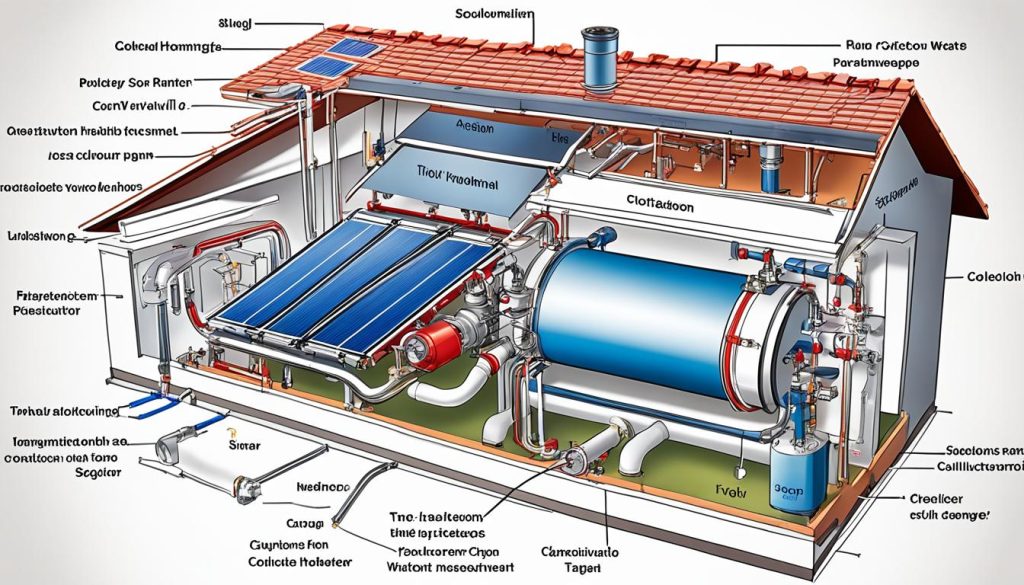
“Solar water heaters are a smart investment that pays dividends for years to come, both in terms of energy savings and environmental impact.”
Solar Water Heater
A solar water heater, also known as a solar geyser, uses the sun’s power to heat water. It’s becoming more popular because it’s good for the environment and can save money over time.
It works by using solar collectors to catch the sun’s rays and heat the water. This heated water is then stored in a tank for later use. Using this system, people can use less energy and produce fewer greenhouse gases.
How Solar Water Heaters Work
Solar water heaters have a few main parts that work together to heat water:
- Solar collectors: These panels catch the sun’s energy and transfer it to the water.
- Storage tank: The heated water is kept in an insulated tank, ready for when it’s needed.
- Circulation system: This system moves the water between the collectors and the tank, keeping it heated.
Heating the water is simple. The sun’s rays hit the solar collectors, warming the water flowing through them. This heated water goes into the insulated tank, staying warm until it’s used.
“Solar water heaters are a smart investment for homeowners and businesses looking to reduce their energy costs and environmental impact.”
Using a solar water heating system brings many benefits. These include lower energy bills, less pollution, and more independence from traditional energy sources.
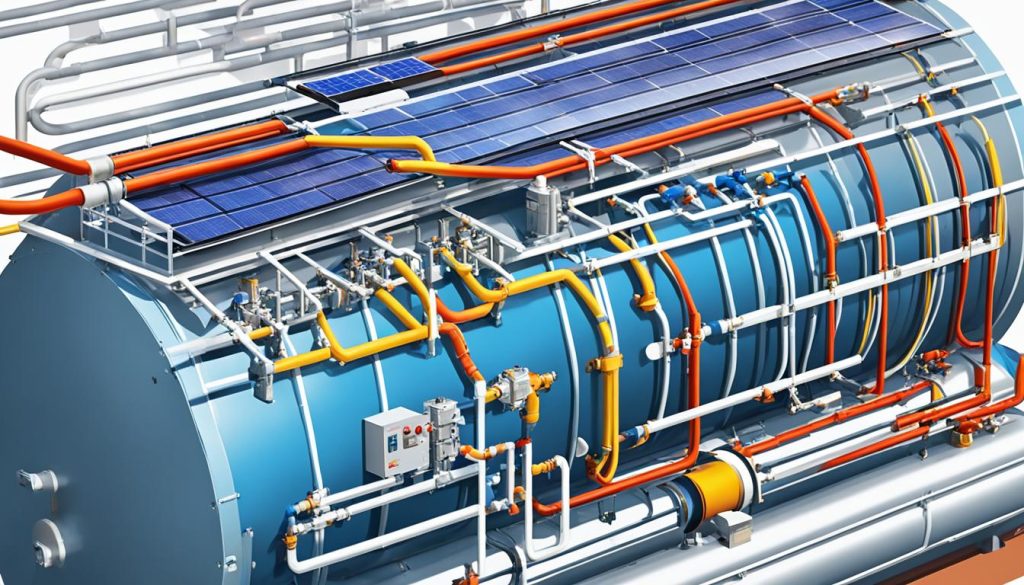
Components of a Solar Water Heater System
Building an efficient solar water heater system takes careful thought. It needs the right parts working together. At the core are the solar collectors and the storage tank. These parts work together to catch the sun’s energy and give you hot water.
Solar Collectors
The solar collectors are key, catching the sun’s heat and sending it to the water. These panels on your roof aim for the sun and turn sunlight into heat well. They move water or a special fluid through the collectors to heat the water for storage.
Storage Tank
After heating, the water goes into an insulated tank. This tank is vital for a steady supply of hot water, even when the sun isn’t shining or when you need more. Its design and insulation keep the water hot, so it’s ready when you are.
The solar water heater parts work well together to turn sunlight into usable hot water. If you want to cut your energy costs or live greener, knowing how these systems work helps. It makes choosing the right solar heater price and water solar price easier.
Types of Solar Water Heater Systems
Homeowners and businesses have many options for solar water heaters. These systems vary in design, function, and what they’re best used for. Knowing about the different types can help you pick the right one for your needs.
The flat-plate collector system is a common choice. It has a flat panel that catches the sun’s energy and sends it to water in an insulated tank. These collectors are tough and work well, making them great for homes and businesses.
Then there’s the evacuated tube collector system. It uses glass tubes with a smaller tube inside each one to keep heat in and send it to the water. These collectors work better in cooler places and can heat water more, making them efficient.
- Solar water heater 200 ltr price: These systems are great for big families or businesses, holding 200 to 500 liters of water.
- Solar water heater 100 ltr price: For smaller needs, like a single person or a small family, a 100-liter system is a good choice.
When picking a solar water heater, think about your location, the weather, how much hot water you need, and your budget. Talking to a professional can help you find the best system for your situation.
“Solar water heaters are a smart investment that can not only save you money on your energy bills but also reduce your carbon footprint and contribute to a more sustainable future.”
Active vs. Passive Solar Water Heaters
There are two main types of solar water heating systems: active and passive. Each has its own benefits. Knowing the differences helps homeowners pick the right one for their needs.
Active Solar Water Heater Systems
Active solar water heaters use pumps to move the water around. They are more complex and need extra parts like a controller and a pump. But, they work better and are more efficient. They can control the water flow and heat transfer well.
Active systems are also more flexible. This means they can be customized to fit specific needs.
Passive Solar Water Heater Systems
Passive solar water heaters use natural convection to move the water. They are simpler and cheaper because they need fewer parts. The sun heats the water, which then moves up and circulates without a pump.
Even though they’re not as efficient as active systems, passive heaters can still give a lot of hot water for a home.
Both active and passive solar water heaters are great for using the sun’s power and cutting down on traditional heating. The choice depends on the budget, space, and what the homeowner prefers.
Installation and Maintenance
Installing and maintaining a solar water heater right is key to its success. Whether you’re setting up a solar geyser or a full solar water heating system, doing it correctly is crucial. It helps you save money and use energy wisely.
Installation Considerations
It’s important to pick the best spot for your solar water heater. Look for a spot that gets lots of sunlight all day. Make sure it’s not blocked by trees, buildings, or other things.
The collectors should be angled and placed just right to catch the most sun. This is important for getting the most energy.
Getting the plumbing and electrical right is also key. You’ll need a pro to connect your solar water heater safely to your home’s systems.
Maintenance Tasks
- Regularly clean the solar collectors to keep them free of dirt and shadows.
- Check and refill the system’s fluid as needed.
- Look for leaks or corrosion in the storage tank.
- Adjust the system’s tilt or orientation if it’s not working right.
- Replace old or broken parts, like pumps or valves, to keep things running smoothly.
By following these steps for installation and upkeep, your solar water heater will keep giving you hot water affordably and sustainably for a long time.
Getting a good solar water heating system is just the start. Proper setup and regular care are what make it work best. This way, you get to enjoy the benefits of clean energy for years.
Factors Affecting Solar Water Heater Performance
The performance of a solar water heater depends on many things. These include the location, climate, and the system’s size compared to the demand. Knowing these factors is key to making your solar water heater work better.
Location and Climate
Where you live and the weather affect your solar water heater a lot. Places with lots of sun and few clouds work best for these heaters. Things like your location’s latitude, height, and how much sun you get in different seasons matter too.
System Size and Demand
The size of your solar water heater and how much hot water you need are also important. You should think about your needs and pick a system that fits. A system that’s too small won’t keep up, and one that’s too big wastes energy and costs more.
By thinking about these things and making smart choices, you can make sure your solar water heater works well. It will give you hot water efficiently and help the planet too.
Cost and Energy Savings
Buying a solar water heater is a smart move for your wallet and the planet. The first cost might be higher than traditional systems, but you’ll save a lot later on.
Initial Investment
The starting price for a solar water heater is between $3,000 to $8,000. This depends on the system size, the solar collectors, and how hard it is to install. But, you can get help from tax credits, rebates, and incentives. This makes it easier for homeowners to afford it.
Long-term Cost Savings
- A solar water heater cuts your monthly bills by using the sun’s energy to heat water, not electricity or gas.
- Over 15 to 25 years, you can save thousands of dollars, based on where you live and your energy costs.
- In some places, you could save 50-80% on your water heating bills. This makes it a great long-term investment.
Think about the upfront cost and the long-term savings before deciding on a solar water heater. The first cost might seem high, but the savings over time make it a wise choice. It helps cut your energy bills and reduces your carbon footprint.
Solar Water Heater Price and Availability
The cost of solar water heaters in India varies a lot. It depends on the size, brand, and local market. A 100-liter model can cost between ₹20,000 and ₹35,000. A 200-liter model might cost from ₹30,000 to ₹50,000.
Government incentives and subsidies can lower the initial cost. This makes solar water heaters more affordable for homeowners and businesses.
In recent years, solar water heaters have become more available in India. Big brands like Tata Solar, Venus, and Havells offer many options. Local manufacturers and suppliers also provide competitive prices and choices.
The Indian government wants to make solar water heaters more accessible. They have started schemes and programs to promote renewable energy. These efforts, like the National Solar Mission and state subsidies, make solar water heaters cheaper and more available nationwide.
FAQ
What is the difference between an active and passive solar water heater?
Active solar water heaters use pumps to move the water. Passive systems let nature do the work, using convection to move the water.
What are the key components of a solar water heater system?
A solar water heater has solar collectors that catch the sun’s energy to heat water. The storage tank keeps the hot water ready for use.
How does the location and climate affect the performance of a solar water heater?
Where you live and the weather can change how well a solar water heater works. Sunlight, temperature, and humidity affect its efficiency.
What are the typical costs and energy savings associated with a solar water heater?
Solar water heaters cost more upfront than traditional ones. But, you’ll save money on energy bills over time. The savings depend on the system size, where you live, and energy prices.
How widely available are solar water heaters in the Indian market?
Solar water heaters are getting more common in India. You can find many models and sizes. Prices start around ₹20,000 for a 100-liter system and go up to ₹40,000 or more for a 200-liter one, based on the features and brand.
- Published in Solar Water Heater

 Call or Text:
Call or Text: 
